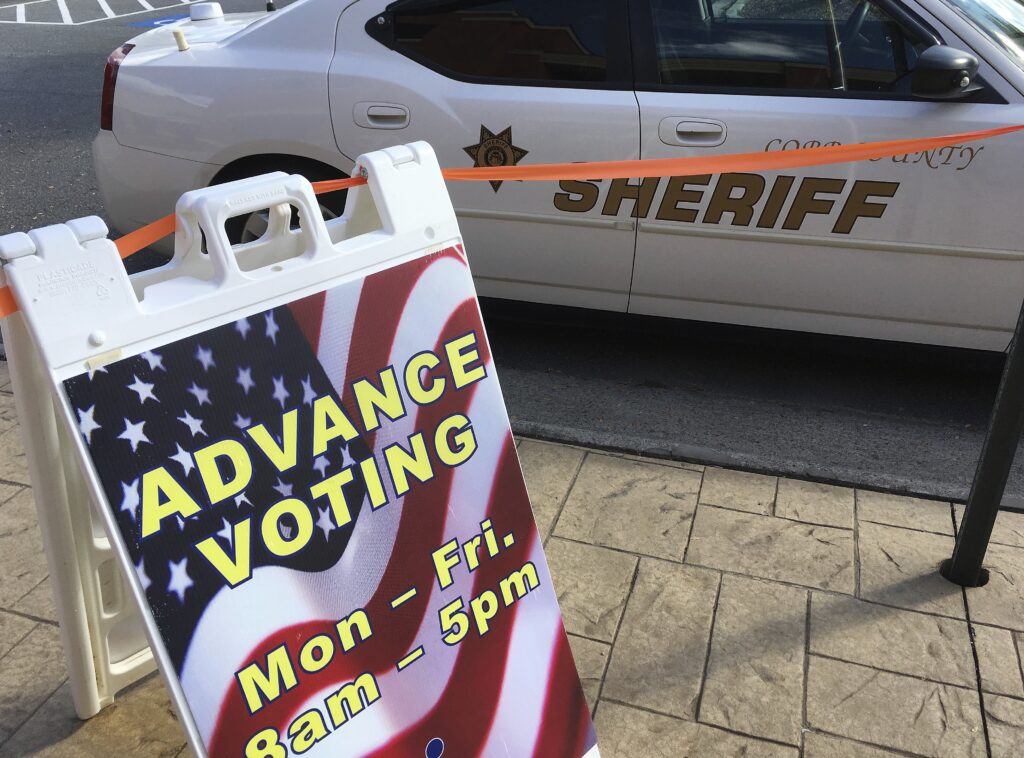Georgia Is First State to Mandate Controversial Election Security Training for Police

Georgia mandated this month that new police officers need to complete one hour of election security training, and activists have expressed concerns.
On June 11, the Georgia Peace Officer Standards & Training Council increased training for new law enforcement officers to complete by Jan. 1, including adding election security training. The council also encouraged current police officers to complete this training prior to the 2024 election.
Chris Harvey, deputy director at the Georgia Peace Officer Standards and Training Council, said he helped develop this training starting in late 2021 after seeing how contentious the 2020 election was.
“Law enforcement officers have zero training in elections and how to respond to elections and what the elections laws are in Georgia…for things like voter intimidation, interference, interfering with officials and illegal activities at polling places,” Harvey said.
He’s also a member of the Committee for Secure and Elections, which released a statement this month on the new training requirement, explaining that Georgia is the first state in the nation to mandate this type of training for new officers and sheriffs.
Harvey said the official training materials will be released on or around July 10. Lauren Groh-Wargo, CEO of Fair Fight, said that isn’t soon enough, especially with the November election approaching.
“I think it’s unacceptable in a state with a history of police violence against Black voters that they have not made these training materials more open and available well before implementing it,” Groh-Wargo said in a phone interview. “It would have been a much better process to put out these standards [earlier] and have some ways to get some community feedback.”
She referenced recent history with law enforcement and elections in the state.
“It was just 2016 where the deputy sheriff was going door to door in Hancock County, challenging Black [residents’] voter registration status,” Groh-Wargo said.
Chris Bruce, the policy director of the ACLU of Georgia, also said that the history in Alabama is crucial to consider when planning and implementing training like this. He added that he’s unsure of the threats that the police are preparing for, which concerns him.
“Unless you’re having conversations with the community about what may happen during the 2024 election, the only thing that I can point to is the past,” Bruce said. “I know the past, and I know what happened when police officers have been deployed in these types of situations. It hasn’t worked out very well for minorities, especially the ones in the Black community.”
Harvey said that the training will specifically prepare officers for threats against election officials, bomb threats, groups or individuals showing up at polling places with the intent to intimidate voters and other security issues.
Both Grog-Wargo and Bruce said that an increased police presence at polling places will have negative impacts on voters, since it may make them feel threatened or intimidated. Harvey said that the training would address that.
“Part of this training does talk about civil rights ramifications and concerns with taking actions or giving the appearance that they’re there to do anything other than keep the peace and protect everyone’s right to vote without any type of fear or intimidation,” Harvey said.
He also said he doesn’t support an increased police presence at the polls, but he wants officers to be prepared if they are deployed on Election Day.
Groh-Wargo reiterated that she and members of her organization are awaiting the release of the training materials.
“We’ll obviously be reading it closely once we get our hands on it, and we’ll be talking with our allies about how we might be able to influence it, if possible,” Groh-Wargo said.